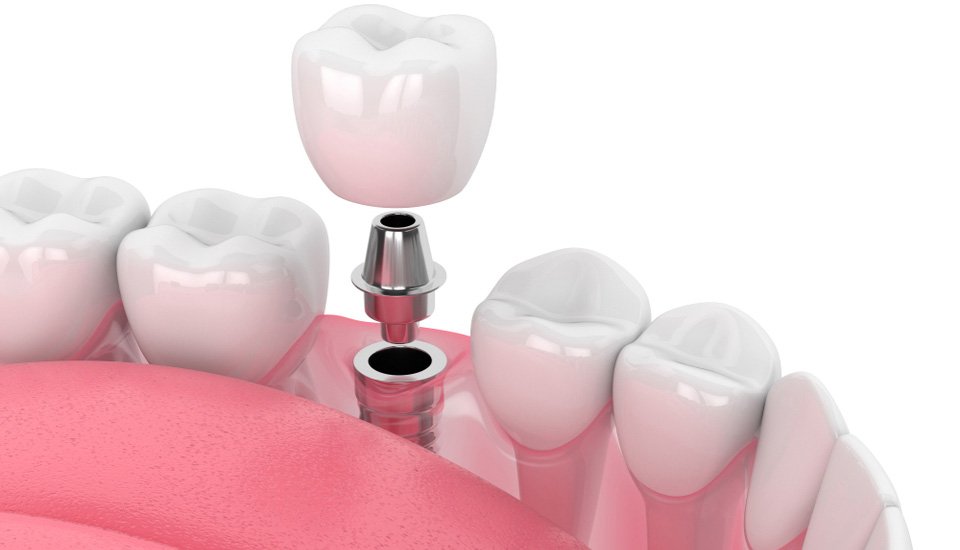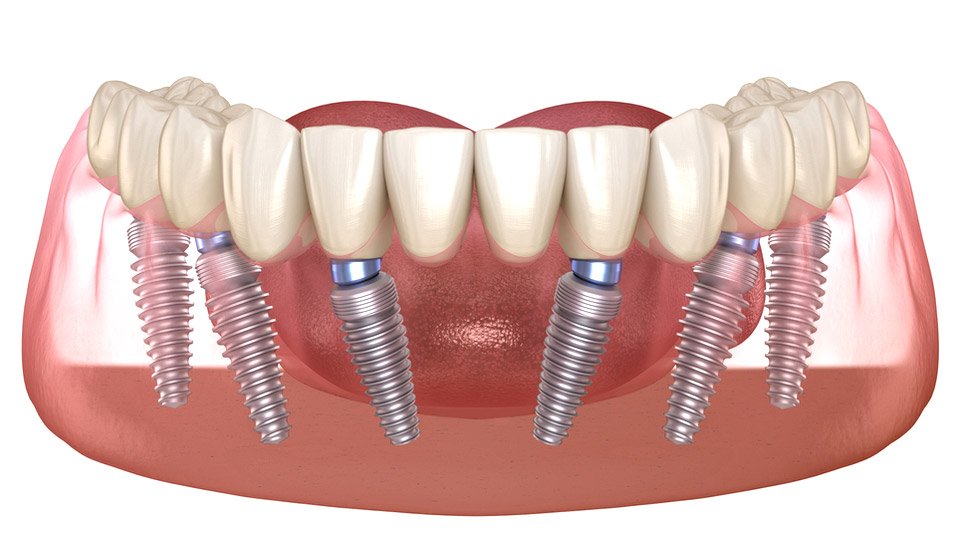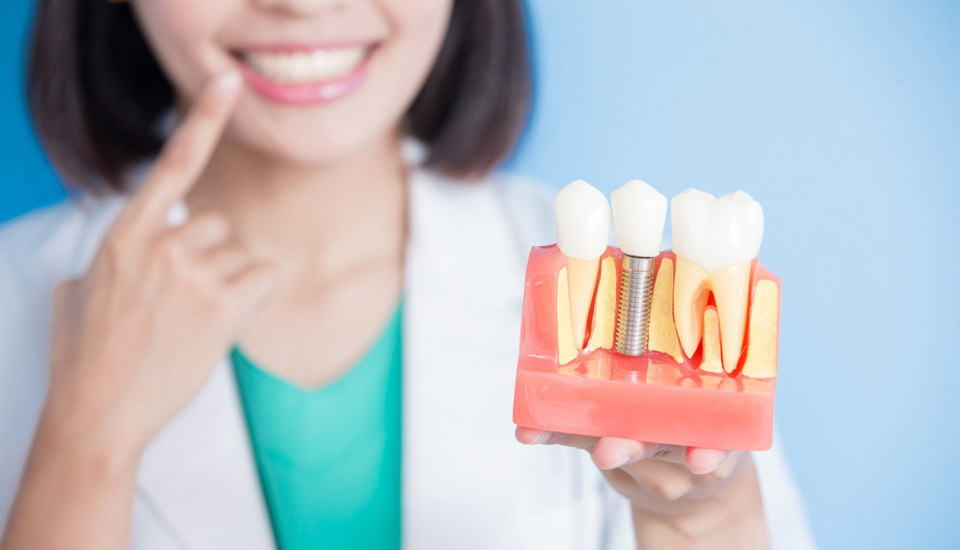Dental Implant
Dental Treatments
Dental implant is a surgical procedure. Replacement tooth is attached to the jawbone with a small titanium screw. The implant can be used to support a crown, bridge or denture to replace the root of a missing tooth.
Table of Contents
So What is a Dental Implant?
- Dental implants are placed in the upper or lower jawbone. They are metal posts or frames. Once the implants are in place, the dentist can attach dentures to them.
- The procedure involves inserting the implant into the gums. It mimics the tooth root.

Types and Methods
Teeth implant material determines:
- durability and longevitiy of the implant
- how the gum reacts to it
- cosmetic side
Most common implant types:
- Titanium and its alloys (aluminium, vanadium, niobium, molybdenum, etc.): They are durable, lightweight, not rejected by the body and economical. Titanium grows with the bone tissue. So, they can last for 25 years and more. This is the most common type of implant.
- Zirconium dioxide: Zirconium dioxide. It is used if the patient is allergic to metal. Another important advantage is that the “root” is not visible through gum. But, zirconium implant is the most expensive one.
Visually, implant shape can be:
- screw, or pin;
- rod, or cylinder;
- plate (used when the jaw has too narrow bone)
The implant design levels:
Level 1: the lower, or root (the one that is in the gum)
Level 2: known as abutment ( an adapter head onto which the crown is screwed)
Level 3: upper, or tooth crown
Dental implantation surgery stages:
Stage 1: Implantation under local anaesthetic takes about 10 minutes. Sutures are removed 10-14 days later.
Stage 2: (after 3 months for the lower jaw / 4 months for the upper jaw). A gingiva former is placed for 7-14 days. This is a small cylinder with a screw. It is screwed into the implant to create a hole in the gum for the crown.
Stage 3: Abutment and denture is placed. The crown lasts from 5-7 to 15-20 years. It depends on the material. When a crown is replaced, the implant does not need to be replaced.
Teeth Restoration:
- All On 4 Dental Implants:
The All on 4 dental implant technique is a complete dental arch restoration. All teeth are supported by four implants. It involves the placement of four implants (supporting 10 to 14 individual crowns) in your upper or lower jaw or both. - All On 6 Dental Implants:
Like all on 4, all on 6 implant procedure involves placing six dental implants in the upper or lower jaw to support 10-14 custom crowns.
you may consider all-on-4 and all-on-6 implants if you have severe tooth decay or loss. You can also consider if the density of the jawbone does not allow the placement of separate dental implants. - Full Mouth Dental Implants
In Full-mouth dental implant process, all your teeth are replaced with fixed dental implants. It can be a perfect solution if you miss all your teeth. Also your dentist can fix your teeth with full mouth zirconium crowns.

Treatment Plan
1.Day:
- Personal consultation with your doctor in the clinic and detailed examination of your tooth.
- To get a dental implant, your gums and jawbone must be free of inflammation. You must also have enough jawbone to support the implant.
- Before and after pictures digital simulation
- Panoramic X-ray of your teeth
- Based on the 3D images of your jawbone, teeth, sinuses and nerves, a drilling template is made. This is used to drill the implant into the bone.
- The gap between your teeth is measured. So, dental implants can be prepared accordingly.
- Afterwards, you can relax, rest in the hotel and enjoy the Spa!
2. Day:
- Your new dental implant is ready now!
- Thorough cleaning of the tooth
- A small incision opens the gum and exposes the jaw.
- Using your personal drilling template, dentist drills the implant site into the jaw.
- The artificial tooth root is then screwed into the jawbone and the wound is closed.
- You won’t feel any pain because of local anesthetic, but you will feel the drill vibrating.
- Final interview with your treating doctor. You will be informed about what you should keep in mind for the next few days.
- The first step of your treatment is finished.
You will receive the lifetime guarantee as well as the certificate for your Dental Implant
After 3 Months:
It’s time for your second visit to Istanbul because implant is now firmly grown together with your jawbone.
1.Day:
- Personal consultation with your doctor in the clinic and detailed examination of your teeth
- Choosing your zirconia crown color
- Measuring the teeth so the crown can be prepared. To do this, an impression is taken. The dental technician needs this to help make your crown accurate.
- Afterwards, you can go to your hotel and relax.
2. Day:
Now you can explore the city and enjoy your holiday!
3. Day:
- Your new crown is ready now and can be attached to the dental implant!
- To do this, the implant is exposed with a small incision.
- The cover screw is exchanged for an abutment that supports your crown.
- Insertion and fixation of the new crowns.
- Check if the crown causes any pressure or pain. Correction if necessary.
- You will not feel any pain as the entire procedure is performed under local anesthesia.
Take a look in the mirror now! Are you amazed by your new teeth?
- Your treatment is completed!
- Final interview with your doctors. They will inform you about what you should do for the next few days.
Dental Implants for:
- If you need one tooth replacement.
- If you need to replace multiple teeth.
- If you need to replace a prosthesis with a bridge supported by multiple implants.
- Those with sufficient density and volume of the jaw bone (otherwise, bone grafting may be required).
Dental Implants Recovery Timeline:
- Healing of the implantation site and the gums usually takes about a week.
- Healing time after the implantation is usually 4–6 months.
Possible Risks for Dental Implants:
- Implant failure (5-10%).
- Infection at the site of implantation.
- Injury or damage to surrounding structures (teeth or blood vessels).
- Damage to nerves during implant placement, causing pain or numbness.
- Violation of the integration of the implant into the bone.
Aftercare
Of course, we’ll also take care of you after your treatment!
Our medical consultants will take care of you during 1 year after the surgery.
If you need any assistance, if you have questions, you can contact our staff at any time.
Dental Implant Healing Process
In total, the healing process will take several months.
The procedure is done under local anesthesia. So you will not feel any pain. There may be some swelling in the mouth for a few days after the implant is placed. This can be easily treated with common painkillers.
Please don’t eat anything until the local anesthesia has worn off completely. Otherwise, you run the risk of biting yourself. There should be no pressure on the implant site for a while so the jaw can heal.
You can eat, bite, talk and laugh just like your natural teeth. You can feel completely relaxed because the denture is firmly attached to the implant.
Dental implant can last a lifetime. However, good oral hygiene and care is important to keep implants and implant-supported dentures working. If possible, you should use dental floss to remove all food particles.

Dental Implant costs by country
The cost of dental Implant depends on the experience of the dentist, the brand used, the clinic or hospital you choose and your individual health condition.
The prices listed below are not a final quotation. Your MedClincs consultant will be happy to provide you with details.
| Country | Price | Rating |
| Turkey | ~ 450 € | ★★★★★ |
| Croatia | ~ 1,050 € | ★★★★ |
| Mexico | ~ 1080 € | ★★★ |
| Poland | ~ 1,100 € | ★★★ |
| UK | ~ 1,780 € | ★★★ |
| Germany | ~ 2,080 € | ★★★ |
| USA | ~ 2650 € | ★★★ |
Dental Implant Procedure Video
FAQ
Why is a dental implant cheaper in Turkey?
In Turkey, salary and living costs are lower than in Europe, and the government subsidizes the health sector. Therefore, dental treatment in Turkey can be done at a much lower cost without sacrificing quality and standard.
Is it safe to have dental treatment in Turkey?
With over 1.5 million medical tourists a year, Turkey is one of the top three health tourism leaders in the world. The health care system in Turkey is strictly monitored and regulated to guarantee the best quality and the highest standards of treatment. Experienced doctors together with a professional team take care of patients professionally and competently. It is safe to undergo dental treatment in Turkey.
What are the advantages of dental treatment in Turkey?
You save on costs, benefit from international quality and avoid long waiting times. In Turkey, you will receive an appointment for dental treatment in a short time, in Germany you will have to wait weeks. Our contract clinics work closely with laboratories and dental technicians, some of which have their own laboratories. Thus, making dental crowns and implants in just a few days is no problem. Another advantage is the short flight times from Europe.
Are there good dentists in Turkey?
Turkey is one of the best countries for dental treatment. On the list of top ten dental tourism countries, Turkey ranks fourth after Poland, Hungary and the Czech Republic. With approximately 86 million population, Turkey ranks 17th in the world in terms of population. Doctors have a lot of practical experience compared to other countries, which makes them competent professionals.
What are the equipment of the clinics where dental treatment is done in Turkey?
Our clinics offer the comfort of a 5-star, high-class hotel. The medical equipment meets international standards of the highest level. Across Turkey, 600 clinics have been awarded the coveted JCI certificate, which attests to safe and effective treatment methods, structured working methods and comfortable conditions. In comparison, fewer than 10 clinics in Germany hold this certificate.
Can I combine my dental treatment with a sightseeing tour?
Of course, you can and should even combine the pleasant with the useful! Even while you are waiting for your new implant or crown, explore Istanbul with the Istanbul Welcome Card Premium. After your treatment is finished, continue your sightseeing without any worries.
What is a dental implant?
A dental implant is an artificial tooth root that is inserted into the jawbone. The actual dental prosthesis, for example a custom-made crown, is then fixed firmly to it.
What are the advantages of a dental implant compared to a conventional bridge?
One of the biggest advantages of an implant-supported dental prosthesis is that healthy neighboring teeth do not have to be ground down, as is the case with a conventional bridge. Lifelong stability as well as natural appearance, wearing and chewing comfort, safety and aesthetics are significant additional advantages.
Is dental implant treatment painful?
Since the procedure is performed under local anaesthesia, you will not feel any pain. You may experience some slight swelling in the mouth area for the first few days after the implant is placed. However, this can be easily handled with conventional painkillers.
How long do dental implants last?
A dental implant can last a lifetime. However, good oral hygiene and care are important for maintaining the functionality of the implant and implant-supported dentures.
History
Even in ancient times, people understood the benefits of tooth replacement.
Archaeologists have found skulls of ancient people whose missing teeth were replaced with items made from various materials, such as iron and seashells. Despite all the primitiveness of the materials and methods available then, the bone successfully fused with some of these implants. This fusion is called osseointegration and is a prerequisite for the reliable functioning of the implant.
Titanium dental implants began to be widely used in the 1970s. Titanium has some advantages: it is lightweight, durable and is not perceived by the body as a foreign material, that is, it is biocompatible. It is currently the most widely used metal for artificial joints and dental implants.
The goal of modern dentistry is to restore oral health to patients. An implant-supported prosthesis often means a more predictable course of treatment than traditional restorations. Doctors and the public are learning more and more about this area of dentistry. Implant dentistry has finally become an established field.
Types of Treatments
Find the best Treatments and most Popular Dentists & Clinics
Request Form
Get your free consultation
- Need guidance and reassurance?
- Talk to a real person from MedClinics!
- Let's find the perfect doctor together.